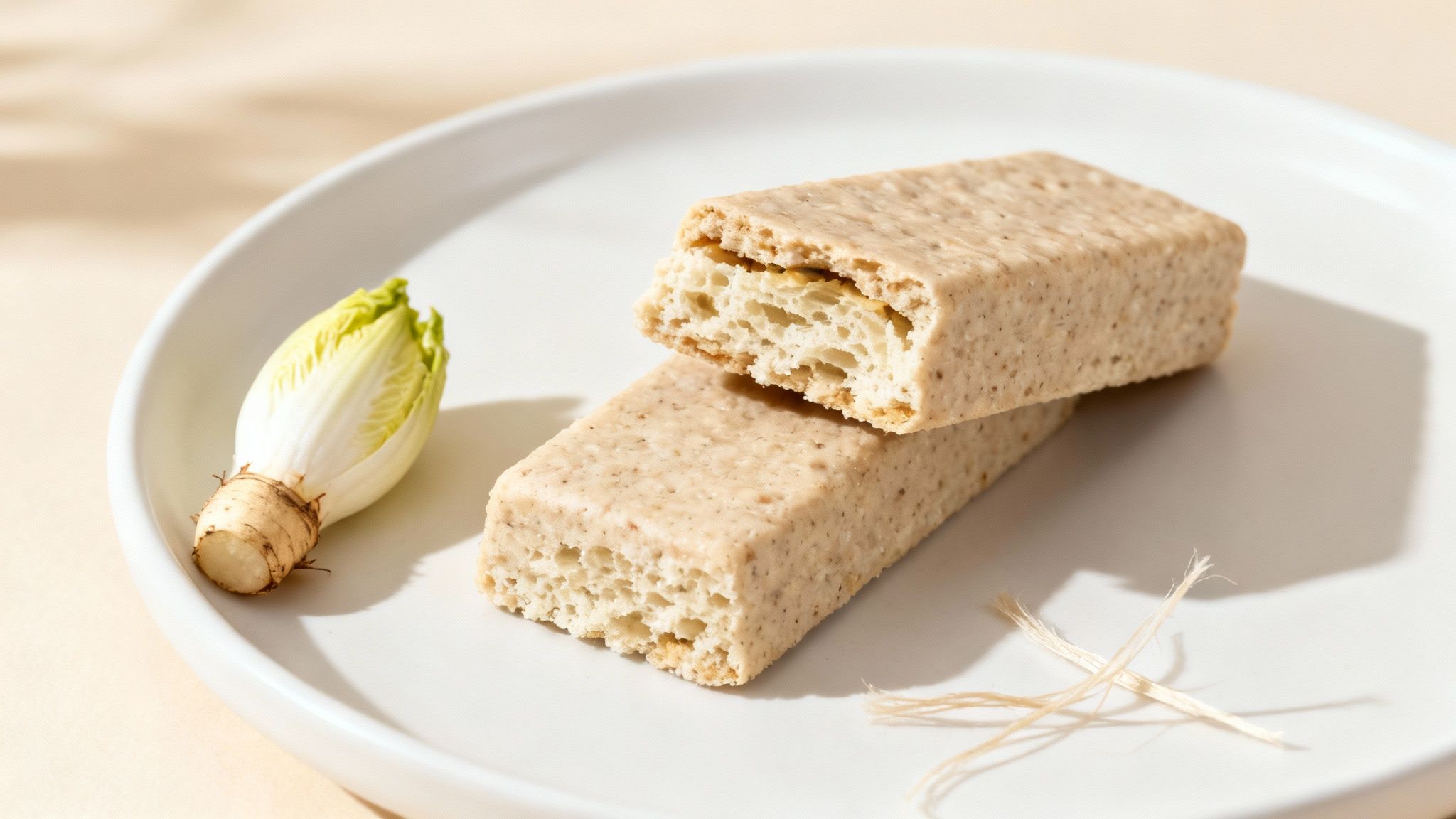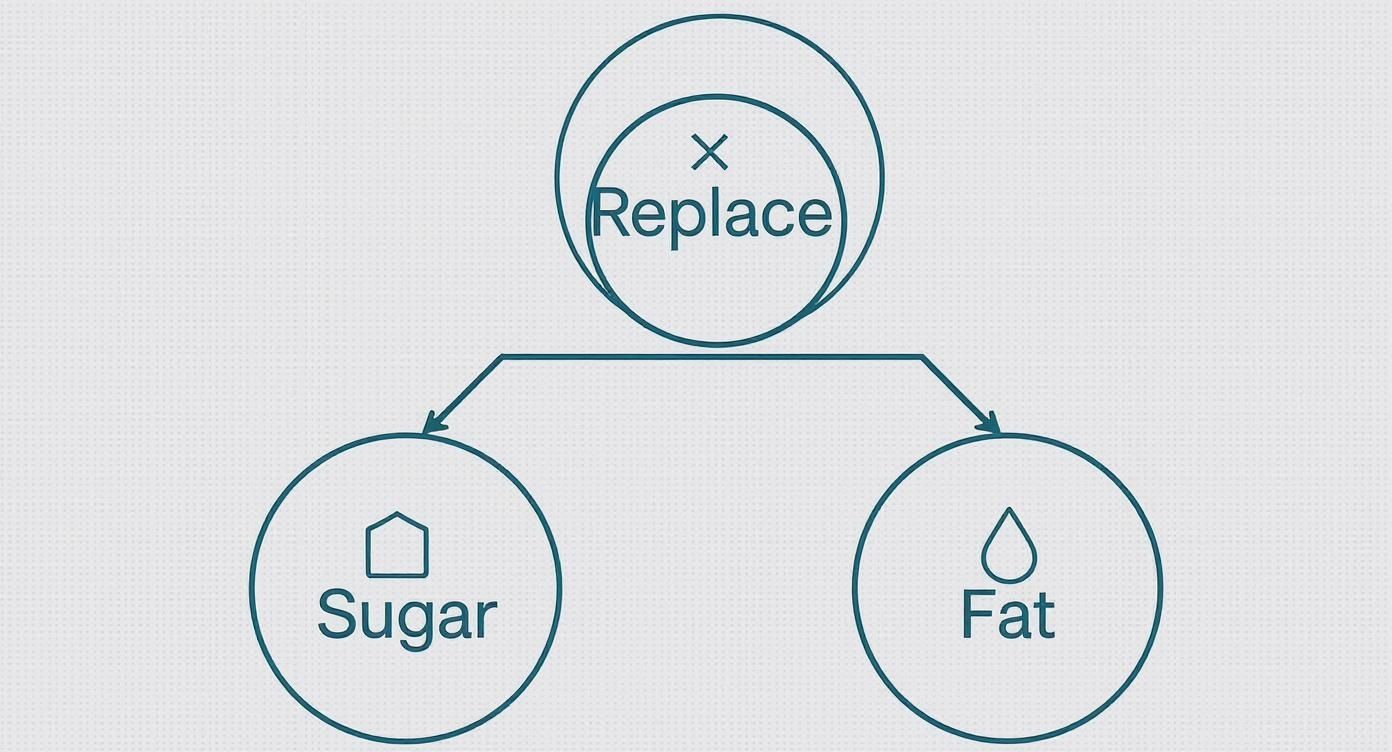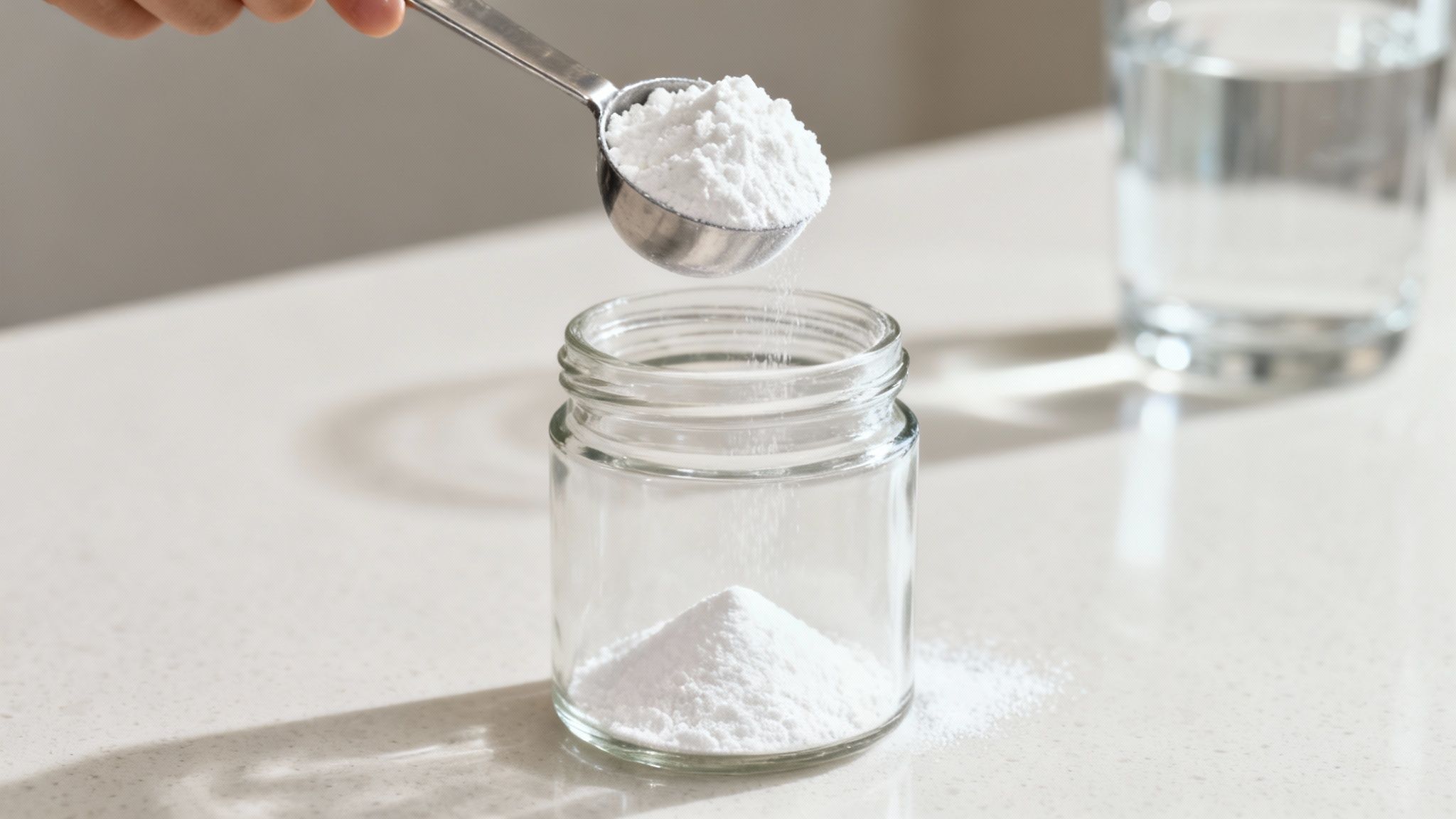
What Are Bulking Agents in Food?
Share
Ever wondered how that low-sugar protein bar holds its shape, or how a diet yoghurt gets its rich, creamy texture? The secret ingredient is often a bulking agent. In short, these are substances that add volume and substance to foods and supplements without piling on the calories or sugar.
Unpacking the Role of Bulking Agents

Think of a bulking agent as the unsung hero of food texture. It’s a bit like building a movie set—you’d use lightweight foam painted to look like a solid stone wall, not actual heavy rocks. Bulking agents do something similar in our food, providing body and a satisfying mouthfeel that makes healthier options far more enjoyable to eat.
They're absolutely crucial in modern food production, particularly for products marketed as low-calorie, sugar-free, or high in fibre. When manufacturers take out ingredients like sugar or fat, they also strip away the volume and texture those components provided. Bulking agents are what step in to fill that gap, helping to improve gut health and overall wellness without compromising the eating experience.
Why They Matter
This clever substitution is what allows us to have foods that fit our health goals without sacrificing enjoyment. For instance, a bulking agent can:
- Add Bulk: It increases the weight and volume of a product, which helps create a feeling of fullness.
- Improve Texture: It can provide that smooth, creamy, or solid texture that would otherwise be missing.
- Maintain Structure: It helps products like protein bars and baked goods hold their shape.
In essence, what are bulking agents? They're functional ingredients that bridge the gap between our nutritional goals and sensory satisfaction. They're the reason you can enjoy a satisfying product—from your morning yoghurt to your post-workout creatine powder—without unwanted additives.
As we dive a little deeper, you’ll start to see how these ingredients pop up in everything from baked goods to your favourite supplements, playing a vital role in both food science and your daily routine.
Why Do Food Brands Use Bulking Agents?
Think of bulking agents as a food scientist's secret weapon, especially when they're trying to create healthier versions of the foods we love. When a company decides to slash the sugar or fat in a recipe, they're not just taking out calories. They're also removing crucial elements that give a product its structure, texture, and overall volume.
Imagine trying to bake a cake without any sugar. You'd likely end up with something flat, dense, and pretty unappealing. This is exactly where bulking agents step in. They fill the void left by the missing sugar or fat, rebuilding the product's internal framework to make sure it looks and feels just like its full-calorie cousin.
It's this clever functional role that makes them so essential for creating things like satisfying low-calorie yoghurts, sugar-free sweets, and high-fibre snack bars that don’t just crumble in your hands.
Keeping Up With Modern Tastes
Today's shoppers are more health-conscious than ever, constantly on the lookout for foods that support their fitness and wellness goals. Bulking agents are the key that unlocks the door to creating products that deliver on both taste and nutritional promises.
They are absolutely indispensable for food brands wanting to manage calorie counts while keeping the mouthfeel and appearance we all expect. For instance, they play a massive part in getting the right texture and volume in confectionery products like chocolate.
You’ll find them used widely across the UK’s food industry—in bakeries, confectionery, and drinks—to provide that necessary bulk without piling on the calories. As the demand for low-calorie and processed foods continues to drive the market, this trend is only going to grow. In fact, the global market is projected to climb from US$3.1 billion in 2025 to US$4.5 billion by 2032, a clear reflection of the worldwide shift towards healthier lifestyles.
At their core, bulking agents give brands the power to reformulate traditional products. They make it possible to lower sugar, fat, or calorie content without sacrificing the sensory experience we all know and enjoy.
This careful balancing act helps people look after their health without feeling like they're missing out on their favourite treats, making bulking agents a true cornerstone of modern food innovation.
Decoding Common Bulking Agents on Labels
Ever flipped over a supplement tub or protein bar and felt like you needed a chemistry degree to understand the ingredients list? You're not alone. The names can look complex, but figuring out which ones are bulking agents is simpler than you might think. Most of them fall into just a couple of main categories.
This infographic breaks down a key reason brands use them: to replace less desirable things like sugar and fat. This is one of their main jobs in creating healthier food and supplement formulas.

As you can see, it's all about subtracting the ingredients you don't want while keeping the product's texture, structure, and mouthfeel just right.
Natural Fibres and Polysaccharides
This is one of the biggest groups you'll come across. These are typically plant-derived ingredients that often pull double duty by adding both bulk and a welcome boost of fibre.
- Inulin: A soluble fibre usually extracted from chicory root. It has a slightly sweet taste and is a popular choice for improving gut health while adding a creamy texture to things like yoghurts and protein bars.
- Cellulose: This is sourced from the cell walls of plants. You'll often see it on labels as microcrystalline cellulose (MCC) or powdered cellulose. It's fantastic for preventing powders from clumping and for adding substance without any calories.
- Polydextrose: A synthetic polymer made from glucose that acts as a soluble fibre. It's a go-to for adding bulk and fibre to everything from snack bars to drinks.
Getting to know these names helps you make more sense of the nutritional information. If you're wondering how these ingredients stack up in your daily diet, it helps to understand what nutrient reference value means and how it all adds up.
Sugar Alcohols (Polyols)
Sugar alcohols are a type of carbohydrate with a unique chemical structure that our bodies don't fully digest. This clever trick means they provide sweetness with fewer calories than regular sugar, all while adding significant bulk and moisture to products.
Their unique structure is the secret sauce—it lets them mimic the texture and mouthfeel of sugar and fat, making them perfect for creating satisfying sugar-free or low-calorie treats.
You'll often spot these on ingredient lists:
- Erythritol: Found naturally in some fruits, it's a firm favourite because it has almost zero calories and is usually very well-tolerated by most people.
- Maltitol: Frequently used in sugar-free chocolates and baked goods for its creamy texture and sweetness, which is remarkably similar to real sugar.
- Xylitol: Best known for the cooling sensation it creates, you’ll find this one in chewing gum, mints, and many oral care products.
To give you a clearer picture, let's compare some of the most common bulking agents side-by-side.
Common Bulking Agents Compared
This table provides a quick reference for the bulking agents you're most likely to encounter on supplement and food labels, breaking down where they come from and what they're best at.
| Bulking Agent | Source | Commonly Used In | Key Feature |
|---|---|---|---|
| Microcrystalline Cellulose (MCC) | Plant pulp (wood, cotton) | Tablets, powders, baked goods | Adds texture and prevents caking without calories. |
| Inulin | Chicory root | Protein bars, yoghurts, beverages | Acts as a prebiotic fibre with a slightly sweet taste. |
| Polydextrose | Synthetic (from glucose) | Sugar-free snacks, drinks, cereals | Low-calorie soluble fibre that improves mouthfeel. |
| Erythritol | Fermented corn or wheat | Keto products, sugar-free sweets | Nearly zero calories and a clean, sweet taste. |
| Maltitol | Starch (corn, wheat) | Sugar-free chocolate, ice cream | Mimics the creamy texture and sweetness of sugar. |
| Xylitol | Birch trees, corn cobs | Chewing gum, mints, dental products | Provides sweetness with a distinct cooling effect. |
Having this handy guide can make decoding labels much faster.
By getting familiar with these common terms, you can start reading labels with more confidence. It's the first step to making more informed choices that truly align with your health and fitness goals.
The Role of Bulking Agents in Your Supplements

Ever wondered why the scoop for your creatine or pre-workout is a certain size? The active ingredients in many supplements—from energy powders to multivitamins—are often incredibly potent, but the actual amount you need is physically tiny. A single, effective serving of creatine monohydrate, for example, might only be a few grams.
If that’s all that was in the tub, you’d be left trying to measure out a minuscule pile of powder. It would be completely impractical. This is where bulking agents come in. They provide the necessary volume to create a consistent, easy-to-use scoop, ensuring you get the right dose every time without needing a jeweller's scale.
But their job doesn’t stop there. These ingredients also perform several other crucial functions that have a huge impact on the quality and usability of your favourite supplements.
More Than Just Filling the Scoop
The best bulking agents are far more than just "fillers." They are functional ingredients, carefully chosen to improve the entire user experience, from the moment you open the tub to the final sip of your shake.
They often wear multiple hats:
- Preventing Clumping: They act as anti-caking agents, keeping the powder loose and stopping it from forming hard, frustrating clumps when exposed to moisture.
- Improving Solubility: Nobody likes a gritty shake. Many bulking agents help the active ingredients dissolve more easily in water, giving you a smooth mix instead of a sludgy mess.
- Enhancing Mouthfeel: They can improve the overall texture, making your supplement smoother and much more pleasant to drink.
In short, what are bulking agents in supplements? Think of them as the unsung heroes that guarantee consistency, mixability, and precision in every single serving you take.
This multi-tasking role is what ensures your high-quality active ingredients can perform as intended. Take a well-formulated product like a vanilla plant protein powder, for instance. The bulking agents help create a smooth, enjoyable shake while making sure each scoop delivers the exact amount of protein promised on the label.
Ultimately, they allow supplement makers to deliver a precise dose in a user-friendly format, all without resorting to unwanted sugars or unnecessary additives. They simply make your daily health routine easier, more effective, and a whole lot more enjoyable.
Are Bulking Agents Safe to Consume?
It’s perfectly natural to glance at a food or supplement label and wonder, "What on earth is that?". When it comes to bulking agents, you can breathe a sigh of relief. In the UK, these ingredients are strictly regulated for safety by bodies like the Food Standards Agency (FSA).
Most of these are far from scary, potent chemical additives. They’re usually derived from everyday plant sources, like chicory root or even wood pulp, and have been used safely in food production for decades. Their main job is simply to add a bit of volume and improve the texture.
That said, everyone’s body is different. Some people can be a bit sensitive to certain types of bulking agents, especially a group known as sugar alcohols.
Understanding Potential Sensitivities
The most common issue people sometimes run into is a bit of digestive grumbling, but this typically only happens when you’ve consumed a large amount of certain bulking agents.
- Sugar Alcohols: You might see names like maltitol, xylitol, and sorbitol on labels. Our bodies don't fully absorb them, which can lead to gas, bloating, or a laxative effect for some people if eaten in excess.
- Fibre Overload: Bulking agents high in fibre, like inulin, are fantastic for gut health. However, a sudden, large increase can sometimes cause temporary bloating as your digestive system gets used to the change.
The key takeaway here is pretty simple: for the vast majority of people, bulking agents are perfectly safe when consumed in moderation as part of a balanced diet. The potential for side effects is generally low and usually linked to overdoing it.
Listening to your body is always the best way to go. If you notice any digestive upset after trying a new product, have a quick look at the label. If you think a specific bulking agent might be the culprit, moderation is your friend.
You can also support your digestive system with a targeted supplement like a Natural Gut Wellness Powder to help maintain a happy balance.
What Does the Future Hold for Bulking Agents?
The way we think about food is changing, and bulking agents are evolving right alongside it. As more of us look for clean-label, plant-based, and sustainable options, the science behind these ingredients is getting a major upgrade. The focus is shifting away from basic fillers towards clever, multi-functional components that come from natural and renewable sources.
This new wave of bulking agents does so much more than just add volume. Think of fibres that not only give a product a better texture but also actively support your gut health. Or imagine plant-based proteins that improve the structure of a food while also boosting its nutritional profile. These are the kinds of smart advancements shaping what we’ll be eating tomorrow.
Innovation is Driven by Demand
This progress isn’t happening in a vacuum; it’s directly linked to what people want. In the UK, the market for food bulking agents is growing, hand-in-hand with the food processing industry and the boom in online shopping. On a global scale, the market hit USD 3.53 billion in 2024 and is set to keep growing, which shows just how much health-conscious consumers are driving the demand for better products. You can dive deeper into these market trends in this detailed industry report.
The future isn't just about taking out sugar or fat; it's about adding real value. Tomorrow's bulking agents will be chosen for what they bring to the table, from boosting wellness to improving sustainability.
Ultimately, technology is making it possible to create foods and supplements that are healthier and more satisfying. This really underlines the vital role that thoughtfully designed bulking agents play in the future of food manufacturing and, more importantly, in our own diets.
Got Questions? We've Got Answers
It's completely normal to have a few questions when you start looking closely at ingredient labels. Let's clear up some of the most common queries about bulking agents and what they really do.
Do Bulking Agents Have Any Nutritional Value?
Surprisingly, yes, many of them do. While their main job isn't to load you up with vitamins, bulking agents like inulin and polydextrose are fantastic sources of dietary fibre.
This means they can be great for your digestive health. They act as food for your friendly gut bacteria, help keep you regular, and can even help you feel fuller for longer after a meal. So, they're not just 'empty' fillers.
Are Bulking Agents Just Another Name for Artificial Sweeteners?
That's a common mix-up, but they are two very different things. A bulking agent is there to add substance, volume, and texture. Some, like the sugar alcohols (think erythritol or xylitol), do have a sweet taste with fewer calories, but their structural role is the real reason they're included.
Artificial sweeteners, on the other hand, are incredibly potent compounds used in minuscule amounts purely for their sweetness. Here's a helpful way to think about it: in a sugar-free cake, the bulking agent is like the flour that gives it structure, while the artificial sweetener is like the tiny drop of vanilla extract that provides intense flavour.
How Can I Spot Bulking Agents on an Ingredient Label?
Once you know what you're looking for, they're pretty easy to find on the ingredients list. Keep an eye out for names like:
- Microcrystalline Cellulose (often listed as MCC)
- Inulin or Chicory Root Fibre
- Polydextrose
- Maltodextrin (a common one used for both bulk and texture)
- Sugar alcohols, which you can usually spot because they end in "-ol" (e.g., Erythritol, Maltitol, Sorbitol).
Getting familiar with these terms is a simple way to get a much better picture of what's inside the products you use.
Ready to take the guesswork out of your health routine? At VitzAi.com, we use smart technology to create personalised supplement recommendations just for you.
Discover your personalised supplement stack today at VitzAi.com
This article is for informational purposes only and is not medical advice. Always consult a qualified health professional before starting any new supplement or major lifestyle change.
